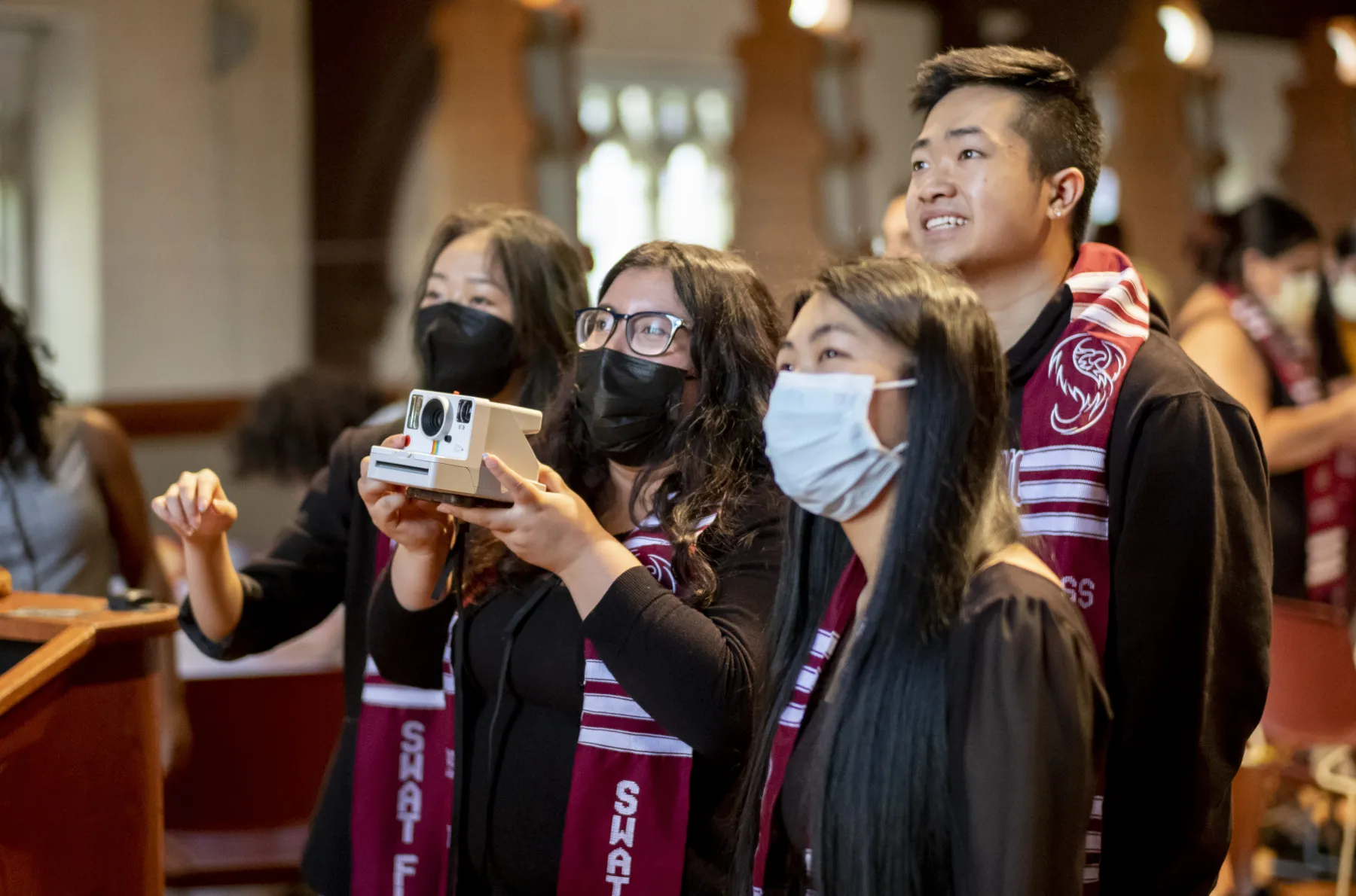Programs and Resources

A reception for FLI Seniors allows an opportunity for students, faculty, and staff to connect to celebrate the accomplishments of FLI Seniors.
Support and Guidance
Swarthmore College provides programs to assist first-generation and low-income students in building community, finding support, and utilizing college resources. We foster a sense of belonging at Swarthmore.
Before You Arrive
Swarthmore realizes that making a decision on where to spend your college/university career is going to be one the hardest and most important decisions of your life. Therefore, Swarthmore is committed to making sure you know how you'll be supported as a Swarthmore student.
Discover Swarthmore
Each fall, we host a few hundred students on campus to explore life at Swarthmore. The weekend is an all-expenses-paid trip to the College, with preference for students who are the first in their families to attend college, students from low-income backgrounds, and students who might not otherwise be able to afford a trip to campus. Learn more about Discover Swarthmore.
Swatlight
Each spring, we host an all-expenses-paid trip to Swarthmore for admitted students from low-income backgrounds, student who are first in their family to attend college, and students working with community-based organizations.
Fees
Application fee waivers are available to students for whom the fee would pose a financial hardship and we automatically waive enrollment deposits for qualified students. In addition, undocumented and DACA-eligible first-year and transfer students are evaluated in a need-blind admissions process and, if offered admissions, their financial need is met with loan-free financial aid awards, as with all students.
SWAT FLI Student Resource Guide
Compiled by SWAT FLI interns and staff, this guide is meant to help you navigate all the resources available to the FLI community here at Swarthmore. Click here to read the guide.
Academic Support
Everyone at Swarthmore is on an intellectual journey. Therefore, the Swat FLI Team partners with the academic deans to bring together several programs that help to define what academic success at Swarthmore looks like.
Academic Workshops
We work individually and with groups of students on achieving their personal academic goals. Topics often include time management, reading strategies, how to participate effectively in class, study skills, test-taking strategies, finding an academic major, or taking time off from school. Sessions are tailored to your needs and help you discover strategies that work best for your particular learning style and goals. Learn more from the Office of Academic Success.
Student Academic Mentor Workshops
Student Academic Mentors (SAMs) are upper-class students specially selected and trained to help students develop and sustain effective learning skills. Each SAM is assigned to a residential hall and mentors a small number of students individually. SAMs also offer workshops throughout the year on academic skills and provide specific information on time management, reading, note-taking, test-taking, course selection, and accessing resources as well as encouragement and general advice. More about SAMs
SUPPORT FOR SUMMER COURSES
These funds support students who have fallen behind in credits and need to take a summer course to catch up. The typical award is around $1000 per course. These funds can also support students needing to take graduate, medical, or law school requirements outside of the college.
Off-Campus Study
Domestic and international programs cost the same to students, so low-income students do not necessarily need to choose from low-cost programs. We also provide additional funding for plane tickets, meals, and local transportation abroad.
Textbooks
The Library tries to provide online access to all books required for courses. See their Course Reserves and Textbooks page. It includes a link to a list of online books available for the current semester. Reach out to Abbie Weil for more information.
Student Emergency Fund
Swarthmore provides support in emergency circumstances. Priority is given to students with the highest financial need. Learn more about the Emergency Fund here.
Mentoring/Professional Development
Financial Aid Workshop
The Financial Aid Office shares information on how to fill out the FAFSA and navigate the complicated process.
Richard Rubin Scholar Mentoring Program
Now in its 17th year, the Richard Rubin Scholar Mentoring Program's fundamental objective is to advance the academic, inter-personal, social, and professional success of Swarthmore College students who are from low-income, disadvantaged backgrounds, and/or first-generation students attending college. More about the Richard Rubin Scholar Mentoring Program
Career Services Open House
Career Services hosts an open house just for first-generation/low income students every semester. Please visit the Career Services FLI Resource Page for more information.
Internship Funding
Instead of having to choose a paid internship over non-profit or community work, students can apply for internship funding from the College, enabling all students to choose internships that interest them.
All students, regardless of immigration status, are eligible to participate in summer opportunities funded through the College as long as the opportunity primarily supports the student’s own academic, research, and/or career aspirations.
Community & Identity Development
Cash-Free Campus
Movie nights, laundry, printing, and athletic events are free to all students. Worthmore is a free store on campus with donated items for students who may face barriers with obtaining supplies. You can find items such as school supplies and room decor.
Swat FLI Community Gathering
Held at the end of both the fall and spring semesters, this is a lunch where students network with faculty and staff who also identify as first-generation.



